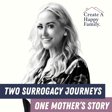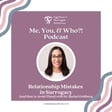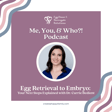
S3 E19 Who?! Supporting the Supporters: Mental Health in Surrogacy and Fertility Care
Get ready for a beautiful and insightful conversation with Dr. Alison Wilson, a licensed psychologist and expert in fertility counseling. As a respected voice in the field and a dedicated advocate for mental health in reproductive journeys, Alison shares her wisdom on the emotional complexities of surrogacy and egg donation covering everything from grief and trust to communication and mental health check-ins.
In this episode, Alison and Whitney dive into the “why” behind becoming a surrogate or egg donor, the emotional highs and lows that often come with the journey, and the power of feeling seen and supported. Alison also shares how she’s now leading support groups for gestational carriers at Egg Donor & Surrogate Solutions, creating safe, empowering spaces for surrogates to connect and thrive.
Whether you're a surrogate, an intended parent, or someone supporting others through this process, this episode is packed with warmth, practical insight, and encouragement for the road ahead.
Takeaways
Mental and Emotional Health Matter: Mental health check-ins and emotional preparation are essential throughout the journey. Awareness of mental health in fertility clinics is evolving, and acknowledging grief, especially for intended parents, is an important part of the process.
Understanding Motivations: Understanding your motivation for becoming a surrogate is key to a successful journey
Take Time for Grief: Taking time to grieve the loss of traditional family-building methods, lays the foundation for a healthy, supported experience.
Power of Support Groups: Support groups offer surrogates a safe space to connect, share experiences, and feel understood. Hearing from others, having strong facilitators, and ending on a positive note all contribute to a supportive environment.
Connection Builds Resilience: Surrogates often bring positivity but also face unique emotional challenges. Connection with others going through similar journeys can be incredibly validating and empowering.
Communication and Trust Are Key: Open, honest communication builds trust between intended parents and surrogates. Managing expectations and trusting the process help everyone navigate the ups and downs with empathy and understanding.
Surrogacy Is a Beautiful Journey: Despite its complexities, surrogacy can be a deeply meaningful and beautiful experience when approached with care, connection, and emotional support.
Links



















